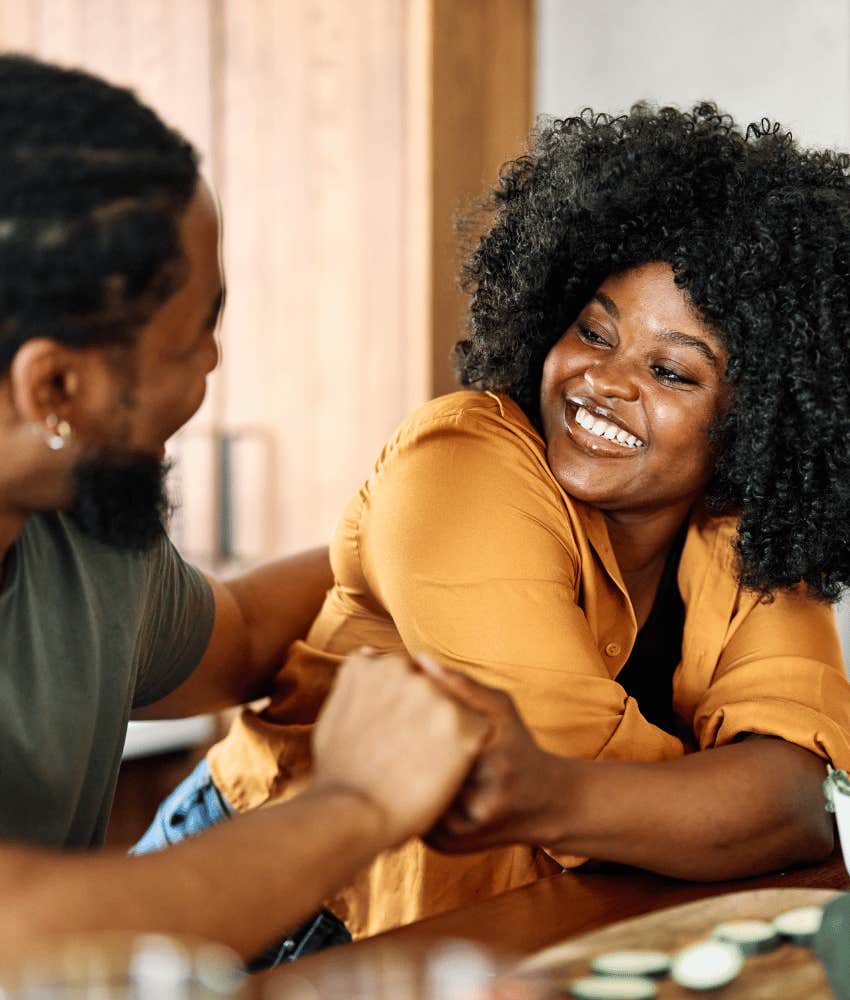8 Reasons Every Chat With Your Husband Turns Into A Critique Fest, According To Marriage Therapist
Tired of feeling like every conversation turns into a performance review?
 Ketut Subiyanto | Pexels
Ketut Subiyanto | Pexels Almost every couple I see in my practice who is experiencing relationship challenges includes communication as a reason for their relationship breakdown. And they are right — so much so, that when they say it, I can barely contain my “yes!”.
At the core of this challenge is hurt, and I doubt these couples appreciate the disconnection created by how they hurt each other through miscommunication.
In whatever way your relationship's connection has been damaged, self-reflection, empathy, and intentional communication will return the keys to each other’s hearts so that every conversation stops feeling like a full-on critique.
Here are reasons every chat with your husband turns into a critique fest:
1. There's no self-reflection
After the assessment, our first collaboration was a request that Sam and Joe explore their feelings, fears, and reactions when they were upset with each other. The following fill-in-the-blank exercises helped them own their part in the communication breakdown.
When (the other person) does this (the hurtful behavior), I feel (the painful feeling), worry that ( the fear), and react by(reaction). This leads to(effect on person/relationship).
2. There's no empathy
 Pics Five via Shutterstock
Pics Five via Shutterstock
Connecting without trying on your partner’s shoes and stepping into their mindset long enough to be aware of and sensitive to their perspective is almost impossible. Without empathy, you will likely focus on making your point and justifying yourself at your significant other’s expense. You win, but your partner's losing is not the key to a healthy connection.
The couple in my office, Sam and Joe, admitted they rarely considered their partner's feelings and perspective. With repeated prompts of, “And what would Joe say," or "How would Sam feel?” they appreciated this was the culprit behind a cycle of misunderstandings. They accepted my suggestion to make an empathy flag and wave it when either felt misunderstood. Who knew bristol board and a drinking straw could make all the difference?
That said, the business of connecting would transpire in their conscious effort to practice intentional communication.
3. There's no active listening
Joe admitted he rarely asked Sam about her day, and when he did, he hurried her through with suggestions and offers to help. He had never considered communication to be anything other than an exchange of facts and ideas or an opportunity for debate. The couple embraced the suggestion of a daily 20-minute chat where each takes turns in active listening and speaking, with the sole purpose of building understanding.
Carl Rogers, the psychologist best known for his person-centered approach, says the best communicators are listeners who ask questions and ensure they share the same interpretation of an event as the person sitting across the table.
When it is a topic that is hard to take, and you are either scared, ashamed, hurt, or disappointed, your ears can close up. When I shut down, it means I have left the relationship, and that has prompted me to slow down, recognize my disconnection, ask for a break, and return to hearing the other’s words and perspective.
4. There's too much defensiveness
A few sessions and many disclosures later, Sam said her silence is a response to Joe’s knee-jerk defensiveness.
The distress was in her tone and the complaint in her words, “He always has a reason, an excuse, an explanation, a denial and deflection for any problem, need or ask that I have." With that, she pleaded for the bare minimum of having him say, "Yes, I did it." She also explained to him that their issues with parenting, money, and renovations remained unsolved because of his defensiveness.
I explored to what extent defensiveness impacted the couple’s relationship and discovered a dangerous turn into blame shifting and projecting where he deftly turned things around on Sam.
A second discovery was that Joe’s defensiveness was from excessive worry and shame of letting Sam down and that he encountered a similar pattern at work. He recalls his early years of harsh reproofs, fear, and choking back the emotions that threatened tears. Sam built a connection by reaching out and assuring him her complaints were not a negative reflection of him. The couple later devised a plan to ask for behavior change unaccompanied by any tone of criticism.
Besides neglecting to listen and the barrier of defensiveness, ignoring your partner’s body language and facial expressions makes it challenging to get to the heart of what matters. This can lead to a habit of quick compromise and moving on without understanding, neglecting the connection nurtured by your effort to know and appreciate your lover.
5. There's off-putting body language
John and Susan (of course, their names have been changed) are another couple who claim poor communication as the chief reason for counseling.
Both intelligent and well-intentioned, they settled into armchairs across from each other, ignoring the loveseat. Understandable behavior when you are not getting along! However, the contracting lines on John’s brow gave hints of his contempt and not his words, “I want to stay together". He folded his arms and clenched his jaw without an effort to relax and soften his eye contact.
She reacted with sarcasm, anger, and criticism. They avoided eye contact, and neither party acknowledged his words, “I want to stay together”. I suggested they imagine their bodies as billboards with bold graphics advertising their thoughts and feelings.
You can soften or harden your message with smiles and open posture or scowls and frowns. So valuable is the messaging of your body that your spouse will trust it at a rate of 93%. If your body language doesn't match your words, you can forget the words.
Consider the person sitting across the room and your goal to repair the relationship. Connect to and acknowledge your feelings at that moment and adjust your body language to reflect an accurate message. Body movement, posture, gestures, touch, space, tone, pace, and inflection will calm or enrage your communication.
Ever wonder why you seem to push them away when you try so hard to be heard and understood? Is it you? Is it them? It may be your posture, facial expressions, gestures, or voice.
6. There's dishonesty
 Prostock-studio via Shutterstock
Prostock-studio via Shutterstock
The following is an example of one woman’s overuse of “Nothing’s wrong,” leading to dishonesty and inconsistency.
John and Penny enjoyed relaxing in bed on Saturday mornings. After a week of commuting and spinning in different directions, they rested and felt like themselves again. One day, John casually mentioned that his boss invited him to join a golf foursome on Saturday mornings. Just for the summer.
Penny could feel the loss of their respite but immediately discounted her feelings and rationalized, “John works so hard that he deserves some time to relax”.
As the summer advanced, Penny’s hurt feelings surfaced with irritability and being unavailable for planned activities. Yet when he asked if she was upset, she said, “No”.
I had heard Penny vent anger, frustration, and resentment of John in his absence while pretending “Nothing’s wrong” when he was around, as suggested by a study in the European Journal of Social Psychology.
If your partner confuses you, you will not feel safe and connected. So, ask each other questions. Agree to be open about your distresses and needs, and resolve the issues between you before they become a source of resentment.
7. There are too many 'you' statements
I like to think of dialogue as a dance in sync and rhythm. Just as you wouldn’t think of dancing at a distance, I hope you don’t hijack the conversation but keep a two-way flow. Pause long enough for your partner to enter the conversation, focus only on the current issue, limit yourself to one or two statements, and don’t “run away” with the topic.
Also, avoid “You” as an opener to express your frustrations and hurt. Instead, use “I” statements. “I” signals responsibility, while “You” sends a message of accusation (regardless of whether you mean to or not). The goal is to send clear signals that help you stay connected, in or out of a fight.
The steps of good dialogue are listening, restating, validation, and empathy, and using them is like learning a new language. At first, it seems awkward and impossible to remember, but as you persist, each step slows the conversation so you understand and digest what the other person means.
8. There's no connection
If you have seen a couple lock eyes across a room, touch fingers, and smile or embrace, you know they have a connection and speak love. Experiment with touch, and check your connection with your partner.
Just yesterday, I asked a couple to explain their communication style, and he jumped right in to describe a tendency to blow up, get it off his chest, and feel better.
“So what about you”? I ask her.
This communication style did not lead to her feeling better. She said, “When he explodes, my heart races, sweat drips from my armpits, I can’t swallow or speak, I can’t think, and I want to run away”. This she does as soon and as often as possible.
His explosive style is an attack, and she withdraws. A study in the Journal of Personality and Social Psychology helped show how her repeated exits lead to an unbalanced relationship where she survives by blending into the background, and he is in a relationship alone. In areas where she feels more confident, she takes a turn at being the attacker. But he is so defensive she retreats and resorts to passive-aggressive behavior, avoidance, or lying.
He expects her to lie, catches her in the act, and shames her into further silence and helplessness.
Can you see why they walk on eggshells, look forward to time away from each other, and even feel like actors in their own lives? They both feel stuck, lost, and alone. They can’t be open and vulnerable. She dreads his touch. He wants what they once had, and she wants to be far away.
Our tools for connection are our words, eyes, ears, and whole bodies. How you speak and listen to your lover must be distinct from what you offer at the office and in the neighborhood. Your partner needs to know they are special, they are secure, and you are available. They may not say this but, when they feel a connection, they are ready to woo and wow you with tenderness and open-heartedness.
Reta Walker is a relationship therapist with over 25 years of experience, specializing in helping couples get back on track.

